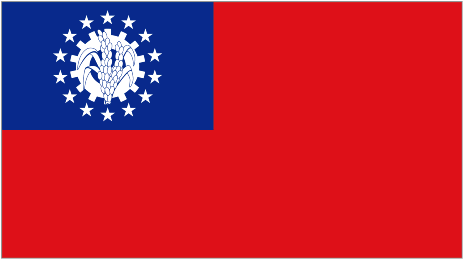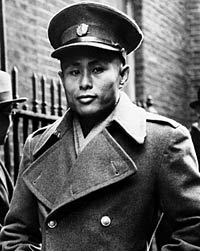January 4

It is not power that corrupts but fear. — Aung San Suu Kyi
The people of Myanmar–formerly Burma–are in a difficult spot while celebrating January 4, the anniversary of their independence. The public secretly reveres the country’s national hero, but cannot utter his name outdoors.
The main force behind Burma’s independence was Aung San. During World War II Aung San was Commander of the Burma Defense Army. He opposed British rule in Burma and saw an alliance with Japan as the way to independence. However, San soon saw that the thin veneer of independence achieved from the British was a sham. For the nation was now under the thumb of the more-controlling Japanese.
Aung San founded the Anti-Fascist Organization in Burma, and led the Burma National Army with the help of the British against the Japanese, whom they ultimately defeated.

In 1947 Aung San negotiated the “Aung San-Attlee Agreement” with the British, which guaranteed Burma’s independence the following year.
Aung San would not live to see the free Burma. He was assassinated along with six other Councillors at an Executive Council meeting in July 1947. He was 32.
Aung San’s daughter, Aung San Suu Kyi, is and has been for twenty years, an outspoken critic of the current Burmese (Myanmar) government.
Suu Kyi was 2 years old when her father died and Burma gained its independence. She lived most of the next 40 years in peace and quiet. At 43 she was “leading a quiet life in England as a housewife and academic.”
http://www.webcom.com/hrin/magazine/jan97/burma.html
She returned to Burma to care for her mother who was gravely ill at the time. A month before her visit in 1988, riot police shot and killed 200 demonstrators, mostly students. In August they killed close to 3,000.
I could not, as my father’s daughter, remain indifferent to all that is going on.
— Aung San Suu Kyi
Martial law was declared in 1989. Ang San Suu Kyi became head of the opposition party, the National League for Democracy. Due to her rising popularity she was placed under house arrest. She would not see her children in 2 1/2 years.
Aung San Suu Kyi should have taken office when her party won the national election in 1990. However, surprised by their overwhelming loss, the military junta refused to acknowledge the election.
According to the BBC, Suu Kyi “has spent more than 11 of the past 18 years in some form of detention under Burma’s military regime.”
As a result “Aung San’s name has been dropped from official speeches. His boyish face has disappeared from Burmese bank notes. His grave has been closed to the public for years.” — time.com
In 1991 Aung San Suu Kyi won the Nobel Peace Prize while under house arrest. When she was released in 1995, she was told if she left the country she could not return. Thus she did not leave even when her husband in London was diagnosed with prostate cancer in 1997. She never saw him again. He died in 1999.
She was placed under house arrest again in 2000, where she has remained for most of the past decade.
The irony of imprisoning the daughter of the father of national independence has not been lost on the military junta. Its military chief Than Shwe has called for a “discipline-flourishing democratic state.”
Whether Aung San Suu Kyi will, unlike her father, live to see the promise land, a democratic Burma, remains to be seen. She still fervently clings to a non-violent approach to regime change, despite knowing that peaceful change may take longer. She believes it is a precedent that must be set.
Update: Aung San Suu Kyi was released from house arrest on November 13, 2010.
